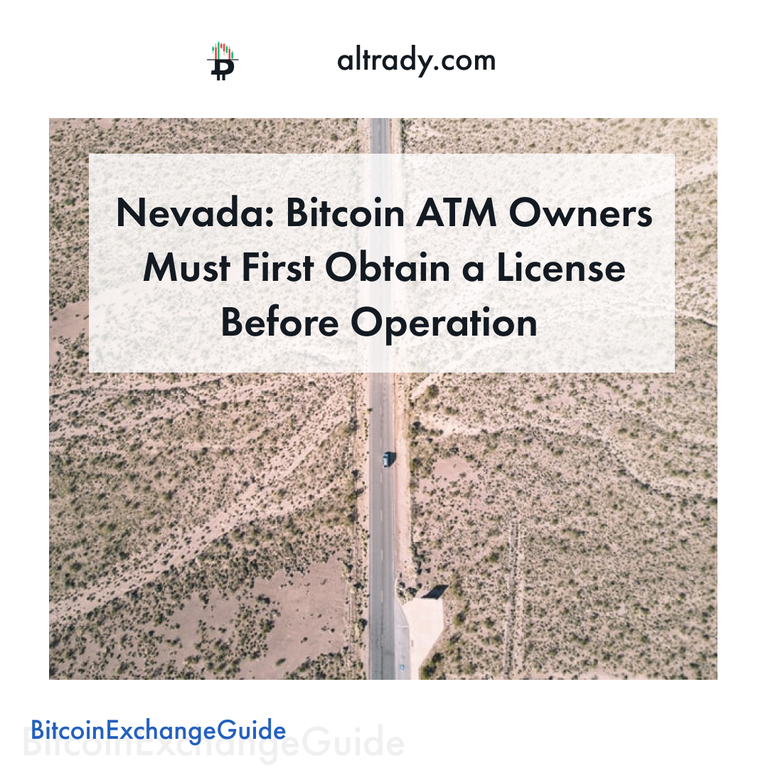
Currently, the United States of America has not yet adopted a universal framework that would regulate cryptocurrency transactions in the country. Because of this, individual states in the US are going to different directions into making their own policies that would govern the crypto industry players in their own jurisdictions.
As Cal Evans, founder of Gresham International has asserted,
“As the Federal government's position remains more and more silent states will look to develop their own framework. When states are left to do their own thing, there is often a massive disparity within their rules. We can see the same thing with the Marijuana industry.”
Now it is worth looking at some of the salient features and the corresponding differences in the regulations of American states with regard to digital currencies.
- Nevada: Bitcoin ATM Owners Must First Obtain a License Before Operation

Just recently, Nevada officials have passed a cryptocurrency law that requires Bitcoin ATM owners to acquire a transmission license before they can operate their ATM kiosks. These licenses have a corresponding cost that may require the operators to pay a bond to the State of Nevada of around $250,000. Then each kiosk will be made available to the digital currency ATM operators for around $5,000. These bonds and fees serve as insurance to the government and the customers in any case of future problems or financial woes.
- Maryland Joins Operation Cryptosweep

Maryland’s attorney general, Brian Frosh, made a statement on August 14 that Maryland is joining the Operation Cryptosweep which is a joint initiative of state and provincial securities regulators in the United States and Canada to investigate businesses and entities that are involved in cryptocurrency investment programs. This joint program is formulated to combat any fraudulent acts that may harm the customers in their jurisdictions. ‘
As Frosh asserted,
“Cryptocurrency investments are risky. Investors should be extra cautious when dealing with promoters who claim their offering does not have to be registered with securities regulators. Quick returns of 150% are as rare as Bigfoot. Make sure to do independent research on the product before you invest. Be aware of the risks, and contact the Maryland Securities Division with any concerns before parting with your hard-earned money.”
- Wyoming Leads the US States in Promoting the Growth of Cryptocurrencies in the USA

As CoinTelegraph asserts, Wyoming is the undisputed leader in terms of crypto-friendly areas in the USA. The state officials and legislators have passed numerous laws on the positive regulation of blockchain and cryptocurrency in the area.
In 2018, Wyoming lawmakers have successfully passed a legislation that provides a legal definition to utility tokens, a new type of asset, which are differentiated from investment opportunities which could otherwise be covered by securities regulations.
The state has also approved a legislation which provided banks with custodial roles on cryptocurrencies. This allowed the banks to administer digital assets and even promote the ownership of digital currencies by the masses through the custody of trusted financial institutions.
- Colorado Exempts Crypto from Securities Regulations & Promotes the Use of Blockchain Technology in Government Operations

It was in March 2019 when the Colorado Digital Token Act was enacted and thereby has successfully exempted digital currencies from securities regulations in the state. For the Colorado state, digital assets are designed for consumptive purposes and these will allow companies using the cryptoeconomic systems to access growth capital that can help boost and expand their businesses.
Furthermore, Denver city in Colorado used a blockchain-based mobile voting application from March 23 to May 7 for the absentee voting during their municipal elections.
As Bradley Tusk commends the move of this Colorado city,
"The one thing everyone agrees on is that our democracy is broken, and politicians make policy decisions based on political inputs and usually nothing else. With turnout this low in national elections, of course we're stuck with rampant polarization and dysfunction. That only changes if turnout soars. That only happens if we move into the 21st century and let people use the tool already in their pockets: their phone. Blockchain makes it secure and feasible. And the Denver Elections Division deserves a tremendous amount of credit for being one of the first to implement an innovative and convenient solution to fix the underlying issues in our government."
- New York City Still Retains Its Policy Governing the BitLicense

Seen by many of those in the blockchain sector and cryptocurrency industry as being highly intrusive, expensive, and unjust, the New York State Department of Financial Services still continues its regulations that govern BitLicense.
But why do crypto exchanges and other crypto-related entities shy away from getting BitLicense?
According to CipherTrace,
“Two of the biggest factors influencing reluctance to acquire the NYSDFS BitLicense are the associated costs and privacy. With a thirty-page application—that comes with a $5,000 application fee—gathering and constructing all the information for the application process alone can amount to upwards of $100,000. Many view the questions in the application as digging too deeply—e.g., it asks about the history of the business as well as information about its’ owners and operators, financial records, and compliance programs such as Anti-Money Laundering (AML) and know your customer (KYC).”
- Ohio Uses Crypto for Business Taxes

As early as November of 2018, Ohio has already made an innovation in their taxpaying mechanisms by introducing the Ohiocrypto.com which allows businesses to pay their taxes in Bitcoin. According to Ohio State Treasurer Josh Mandel, the reason for introducing such means of tax payment is “to project to the rest of the country and the world that the state of Ohio is a leader in blockchain technology. I believe if we’re going to grow our technology economy here in Ohio, we have to first be a leader in technology.”
- California as the Headquarters of Digital Currency Exchanges and Crypto Companies Yet Without a Regulation

Currently, California seems to be a friendly hub for crypto businesses such as Coinbase, Ripple, and Kraken since these companies have their headquarters in this US state. Despite the presence of large crypto companies in the area, there still remains to be an absence of regulation coming from the state officials. Or is it the absence of regulatory frameworks that make California as the most viable headquarters for such cryptocurrency businesses?
GET YOUR FREE 30 DAYS TRIAL SUBSCRIPTION ON OUR ULTIMATE TRADING PLATFORM:
For more blockchain news and cryptocurrency updates, always visit https://blog.cryptobasescanner.com/.
Follow our social media channels:
https://www.facebook.com/altradyapp/
https://twitter.com/altradyapp
https://www.instagram.com/cryptobasescanner/
https://steemit.com/@basescanner/
https://medium.com/@base_scanner
Congratulations @basescanner! You have completed the following achievement on the Steem blockchain and have been rewarded with new badge(s) :
You can view your badges on your Steem Board and compare to others on the Steem Ranking
If you no longer want to receive notifications, reply to this comment with the word
STOPTo support your work, I also upvoted your post!
Vote for @Steemitboard as a witness to get one more award and increased upvotes!